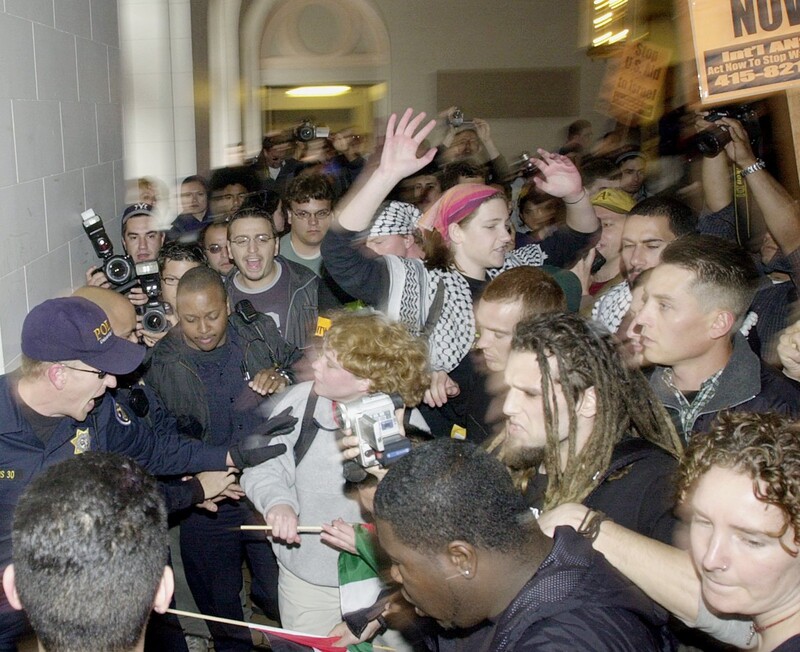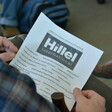The Electronic Intifada 9 September 2020

Pro-Palestine activists scuffle with campus police at UC-Berkeley in 2002. By conflating Judaism with Zionism, campus organizations like Hillel perpetuate the myth of a religious conflict in Palestine, instead of a national liberation struggle.
KRTIt is far too often the case that the only spaces dedicated to Judaism and Jewish culture on college campuses in the US and beyond are also affiliated with Zionism.
When it comes to campus discussion on Palestine, this leaves little room for exposure to any Jewish-led narrative outside of Zionism, fueling the misconception that Palestine’s struggle for liberation is a religious conflict. This not only harms the liberation movement, but also students.
One of the best known campus organizations to claim affiliation with Judaism is Hillel. Most Hillels on university campuses are tied to Hillel International, an explicitly Zionist organization.
According to Hillel International guidelines, a campus Hillel cannot partner with or host any organization that “delegitimizes, demonizes, or applies a double standard” to Israel. Restricting free speech is certainly an interesting approach for a group that claims to “pursue social justice”.
Negative effects on students
As the self-proclaimed “largest Jewish campus organization in the world,” Hillel’s ties to Zionism make it appear to students who have not critically engaged with the literature or issues surrounding settler-colonialism, apartheid, or self-determination, that Judaism and Jews are inextricably linked with Israel.
Palestinian human rights advocates on campuses are frequently put on the defensive where they must respond to false claims of anti-Semitism for simply speaking out against Israeli apartheid. These claims can come from Zionists or others who conflate Zionism and Israel with Judaism.
Hillel’s erasure of anti-Zionist Jewish students’ perspectives causes further damage. It is particularly harmful when the sole campus organization dedicated to Jewish culture is Hillel or any other Zionist organization. Non- or anti-Zionist Jews do not have a space that represents their identity or values, and they are excluded and shut out.
Hillel’s existence on campuses meanwhile promotes the idea that Judaism and Jews are all in accordance when it comes to Israel. One of Hillel’s mottos, “Wherever we stand, we stand with Israel,” is incredibly alienating to Jewish students who are critical of Israel.
Negative effects on the liberation movement
The conflation of Zionism with Judaism is not new. That it persists on campuses deters the Palestinian liberation movement through the way it is perceived by the community. Palestinians and Jewish identities are presented as rigid dichotomies.
Students involved in the liberation movement must dedicate time and energy to explaining to peers the difference between anti-Zionism and anti-Semitism instead of pushing forward with more radical or direct actions.
In a campus environment where there is a Hillel group and a chapter of Students for Justice in Palestine, the perception is that a Jewish-affiliated organization and a Palestine solidarity organization are in continual direct opposition. The perception entrenches the idea that the Palestinian liberation movement is somehow a religious conflict instead of a human rights issue.
The normalization or acceptance of Israeli apartheid is an overlooked consequence of when the only organization on campus dedicated to Judaism and Jewish culture is linked to Zionism. Any activity or programming by such an organization will inevitably normalize Israeli apartheid by ignoring that reality while promoting a more positive image of Israel, whether these concern technology, LGBTQ+ rights, or the environment.
To be sure, there can simultaneously be Zionist organizatons and groups on campus who actively speak out against Israel. However, students, faculty, staff and administrators committed to peace, justice, and anti-racism efforts should question why their only Jewish-affiliated organization on campus has a political agenda that serves a foreign state.
Lessons learned
My experience as a student organizer revealed that the majority of my peers on campus either suffered from a gross lack of knowledge or were exposed to Zionist propaganda. It often means that when Students for Justice in Palestine issues a statement or holds an event, organizers first have to deal with the prevalent and false belief that Palestine is an issue in which two equally powerful sides hold equally valid positions.
Defaulting to this position seems especially easy for a college student, in part due to the way many are introduced to the topic. Most often, Palestine is introduced under the guise of the “Israel/Palestine conflict” and not “Israel is an apartheid state” or “occupier versus occupied.”
The depth of ignorance regarding Palestinian liberation even crept into my work with the Desmond Tutu Peace Lab, an undergraduate student think tank at Indianapolis’ Butler University dedicated to research, activism, dialogue and advocacy.
There were objections within the peace lab’s membership regarding the decision to support a boycott of Hillel’s hosting of A Wider Bridge, an Israel lobby group that engages in pinkwashing.
The irony is that Desmond Tutu, for whom the peace lab is named, has characterized Israel as an apartheid state. Yet here peace lab members were demanding that “both sides” be represented in order to remain “unbiased.”
It is deeply concerning when organizations dedicated to peace and social justice struggle with basic understandings of injustice and human rights.
Zionism should have no place or standing in such organizations on college campuses. Zionist organizations like Hillel only perpetuate narrow-minded thinking and reinforce racism.
Reilly Simmons is a graduate student at American University’s School of International Service.


